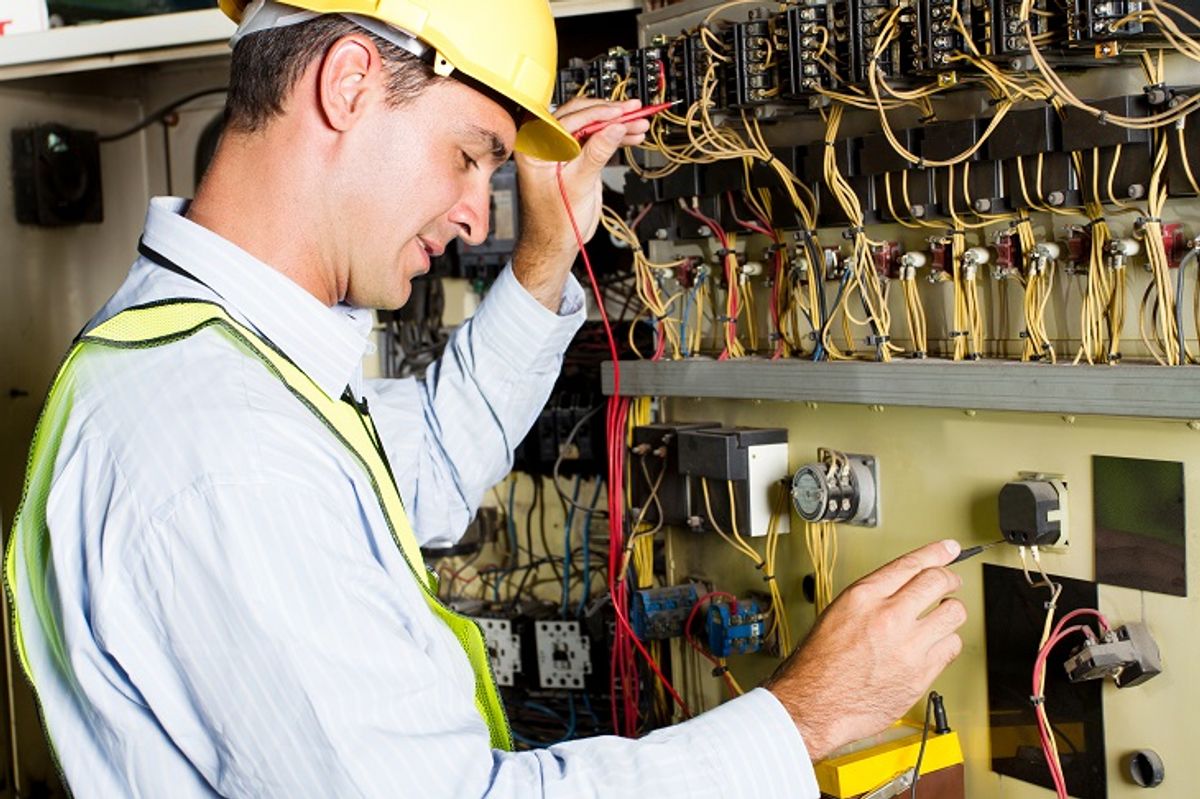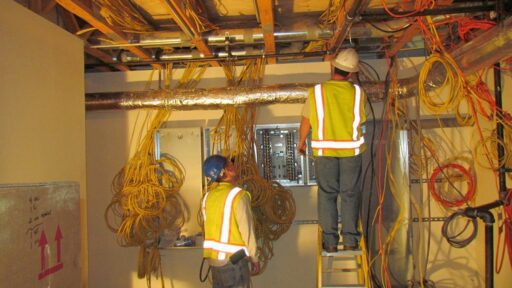Obtaining a Texas Electrical Contractor License is a critical step for those looking to operate legally and professionally within the electrical trade in Texas. This guide provides a comprehensive step-by-step approach to navigating the licensing process, from understanding the requirements set by the Texas Department of Licensing and Regulation (TDLR) to maintaining and expanding your license. Whether you’re a seasoned electrician or a new entrant to the industry, this guide aims to simplify the complex journey toward becoming a licensed electrical contractor in the Lone Star State.
Key Takeaways
- Familiarize with TDLR prerequisites and satisfy experience requirements for specific electrical trades before applying.
- Utilize quality study materials and understand the National Electric Code to prepare for and pass the mandatory licensing exam.
- Complete the application process accurately, including gathering necessary documentation and paying the relevant fees.
- Recognize the differences between state and municipal licensing requirements and obtain any additional certifications needed.
- Maintain your license through continuing education and consider expanding your business with additional licenses and permits.
Understanding the Licensing Requirements

Familiarize Yourself with TDLR Prerequisites
Before embarking on the journey to become a licensed electrical contractor in Texas, it’s crucial to understand the prerequisites set forth by the Texas Department of Licensing and Regulation (TDLR). These prerequisites are designed to ensure that all applicants have a foundational level of experience and knowledge before entering the field.
To meet the TDLR requirements, candidates must gather significant work experience. This can be achieved through various pathways, such as:
- At least four years of experience working under a licensed HVAC contractor within the past six years.
- Holding a technician certificate for the past 12 months, combined with three years of experience under a licensed contractor within the past four years.
It’s important to note that certain educational achievements or training may qualify for an experience exception, potentially reducing the time required in the field.
Once you have met the experience prerequisites, the next step is to prepare for and pass a licensing exam. The TDLR has partnered with approved exam providers, like PSI Exams, to administer these tests. The exams are comprehensive, covering not only trade knowledge but also specific Texas regulations and laws.
Experience Criteria for Electricians and HVAC Technicians
To qualify for a Texas Electrical Contractor License, applicants must meet specific experience criteria. For electricians, this includes demonstrating extensive job knowledge and understanding of the trade, including practices, methods, tools, materials, and equipment. Knowledge in all areas of the national electrical code is also essential.
For HVAC technicians, the requirements are equally stringent. Candidates must complete 48 supervised hours of practical experience or have a combination of education and hands-on training. The following list outlines the basic experience requirements:
- Be at least 18 years of age
- Be a US citizen or legally reside in the country
- Have no convictions of a disqualifying offense
- Demonstrate a certain number of hours of on-the-job training and experience
The HVAC scene in Texas is ripe, and securing the right licenses is about upholding safety, professionalism, and opening doors to numerous opportunities.
Personal qualities can also play a significant role in succeeding in these trades. Traits such as honesty, adaptability, and good hand-eye coordination are highly valued in the industry.
Exam Requirements for Specialty Trades
Specialty trades in Texas, such as electrical and HVAC work, require passing a mandatory licensing exam. Candidates must demonstrate proficiency in both trade knowledge and Texas-specific regulations. Many find these exams challenging and opt for online study guides and preparatory courses to ensure success.
The exam process is distinct for each trade, necessitating thorough research into the specific requirements for the desired license. For instance, HVAC specialists must complete 48 hours of supervised practical experience before applying. It’s crucial to leverage quality study materials to gain the necessary insights and techniques to excel on the contractor exam.
Note: The application process for each trade is unique, and it’s imperative to understand the exact licensing process for the license you are pursuing.
Here’s a quick overview of the common requirements for specialty trade exams in Texas:
- Be at least 18 years of age
- Be a U.S. citizen or have legal residency
- Have no convictions of a disqualifying offense
- Satisfy the experience requirements, such as the 48 hours of practical experience for HVAC specialists
Preparing for the Licensing Exam

Study Materials and Resources
To excel in the Texas Electrical Contractor License exam, a comprehensive study plan is essential. Access to quality study materials and resources can significantly impact your exam performance. The eCampus platform offers a robust suite of tools to aid in your preparation, including videos, practice questions, and key concepts that mirror the real exam experience.
Here’s a list of topics you might encounter during your study sessions:
- Electrical theory and code
- Business and law
- Blueprint reading and estimating
- HVAC systems and controls
- Safety protocols
Remember, a well-structured study plan that covers all relevant subjects is crucial for success. Allocate time for each topic and use a variety of resources to reinforce your learning.
Courses are available online 24/7, allowing you to study at your own pace. The cost for access to these comprehensive materials is typically around $599.00, which includes continuous access until you pass all licensing exams.
Understanding the National Electric Code
The National Electrical Code (NEC) is not just a crucial part of licensing exams; it’s a comprehensive guide that electricians must adhere to in their daily work. Understanding the NEC is vital, as all electrical work is subject to inspection, and compliance with the NEC is a key factor inspectors assess.
The NEC is updated periodically by the NFPA, with new editions released to reflect the latest safety standards and practices. As an electrician, staying current with these updates is essential for both legal compliance and professional competency.
The NEC covers a wide range of guidelines for electrical work in various settings, making it an indispensable resource for electricians.
Electrician training programs emphasize the importance of the NEC, teaching skills such as reading blueprints, interpreting local regulations, and following safety procedures. Mastery of the NEC is a clear indicator of an electrician’s ability to tackle complex electrical systems and ensure safety and efficiency. Here’s a list of key skills related to the NEC that you may learn:
- Reading and interpreting blueprints and technical diagrams
- Interpreting the NEC and local regulations
- Following safety procedures
- Calculating loads, wiring lengths, and room dimensions
- Proficiency with tools and equipment like wire strippers, conduit benders, and various testers
- Installing, inspecting, troubleshooting, and repairing electrical components
Exam Tips and Techniques
Approaching the Texas Electrical Contractor License exam requires a strategic study plan. Focus on understanding the concepts rather than memorization to ensure you can apply the knowledge effectively. Utilize online study guides and preparatory courses to familiarize yourself with Texas-specific regulations and laws.
- Review General Theory and Electrical Principles
- Practice Plan and Specification Reading
- Understand Wiring and Protection
- Learn about Wiring Methods and Materials
- Study Special Occupancies and Situations
- Comprehend OSHA and Safety Procedures
It’s crucial to not only study the material but also to practice with sample questions and timed exams. This will help you manage your time effectively during the actual test.
Remember, the exam will test both your trade knowledge and your understanding of state-specific regulations. Pay special attention to subjects like Electrical Signs, Outline Lighting, and Structural Considerations, as well as Alarms/Limited Energy. Keep your study sessions short and focused, and ensure you get adequate rest before the exam day.
Completing the Application Process

Gathering Necessary Documentation
Before submitting your application to the Texas Department of Licensing and Regulation (TDLR), it’s crucial to gather all necessary documentation. This step is foundational to your licensing process and ensures that your application is considered complete.
The required documents typically include:
- A detailed resume outlining your work experience
- Proof of any educational qualifications
- Technician certificates, if applicable
- Documentation for any experience exceptions based on relevant education or training
Remember, incomplete or incorrect documentation can delay the process or lead to disqualification, similar to the licensing process in other states like Florida. It’s advisable to double-check all entries and ensure that every piece of information is accurate and up-to-date.
Pay special attention to the details of each document. A minor oversight can be the difference between a smooth application process and unnecessary setbacks.
Submitting Your Application to the TDLR
Once you have gathered all the necessary documentation and confirmed that you meet the licensing requirements, the next step is to complete and submit your application to the Texas Department of Licensing and Regulation (TDLR). It’s crucial to ensure that all information provided is accurate and that any supporting documents are attached to avoid delays in the processing of your application.
The application process is a critical step where attention to detail can save you time and effort. Double-check your application before submission to ensure all requirements are met.
After submitting your application, you will need to pay the licensing fee, which is a mandatory part of the application process. As of the latest update, the fee for an HVAC contractor license is $115. Below is a summary of the steps involved in submitting your application:
- Complete the application form with accurate information.
- Attach all required supporting documentation.
- Submit the application to the TDLR.
- Pay the required licensing fee.
Paying the Required Licensing Fees
Once your application is ready, the final step before submission is to pay the licensing fees. These fees are mandatory and vary depending on the type of license you are applying for. It’s important to ensure that the correct amount is paid to avoid delays in the processing of your application.
Here is a breakdown of the fees for some common electrical contractor licenses:
| License Type | Application Fee | Exam Fee | Renewal Fee |
|---|---|---|---|
| Master Electrician | $50 | $78 | $35 |
| Journeyman Electrician | $25 | $47 | $20 |
| Residential Wireman | $20 | $37 | $15 |
Remember, these fees are subject to change, and additional charges may apply for late renewals or other administrative actions. Always check the latest fee schedule on the Texas Department of Licensing and Regulation (TDLR) website.
After paying the fees, keep a copy of the receipt or confirmation as proof of payment. This will be crucial if any questions arise regarding your application status.
Navigating State and Municipal Licensing
Differences Between State and City Requirements
While general contractors in Texas aren’t required to have a state license, specialized trades such as electricians, HVAC specialists, and plumbers must adhere to state regulations. It’s crucial to understand that the licensing requirements can differ significantly between state and city jurisdictions.
For instance, in Austin, contractors must register with both the Development Services Department and the state to legally operate. This dual registration ensures compliance with local standards, which may include additional permits, fees, or insurance requirements.
The specific requirements vary by state and municipality. Always check with local authorities like the state licensing department or state fire marshal division to determine the exact requirements for your area.
Here’s a brief overview of licensing requirements in various trades:
| Trade | State License Required | City License | Annual City License Fee | Surety Bond Required | General Liability Insurance |
|---|---|---|---|---|---|
| General | No | Yes | Varies | None | None |
| Electrical | Yes | Yes | No | None | Minimum State Required |
| HVAC | A or B | Yes | No | None | Minimum State Required |
Remember, these are just examples, and the actual requirements may change. Contractors should verify the current standards with local authorities to ensure full compliance.
Obtaining Additional Certifications
After securing your Texas electrical contractor license, you may consider expanding your qualifications with additional certifications. These certifications can open doors to new opportunities and allow you to specialize in areas that are in high demand.
For instance, obtaining a certificate in Electrical Technology can be a significant asset. This curriculum is designed to provide the training necessary to fill entry-level positions in fields such as construction and maintenance, enhancing your employability and service offerings.
It’s important to recognize that additional certifications can lead to an experience exception, which may streamline the process of qualifying for certain licenses.
Below is a list of common certifications that may benefit your business:
- Electrical Technology – Certificate
- HVAC Excellence Certification
- National Electrical Contractors Association (NECA) Certifications
- Building Performance Institute (BPI) Certification
Each certification has its own set of requirements and benefits, so it’s crucial to research and determine which ones align with your business goals and the services you wish to provide.
Keeping Up with Local Regulations
Keeping up with local regulations is essential for electrical contractors to ensure compliance and avoid penalties. Local amendments to building codes can significantly impact your work and may vary from one municipality to another. For instance, the 2021 amendments to the National Electrical Code and various other local codes in Texas reflect changes that contractors must adhere to.
To stay informed, regularly check the official city or county websites for updates. For example, the city of Amarillo provides a list of recent ordinances that affect contractors:
- 2021 Existing Building Code Local Amendments & Ordinance (ORD #8089)
- 2021 Fuel Gas Code Local Amendments & Ordinance (ORD #8088)
- 2021 ISPSC Local Amendments & Ordinance (ORD #8083)
- 2021 Mechanical Code Local Amendments & Ordinance (ORD #8085)
- 2020 National Electrical Code Amendments & Ordinance (ORD #8090)
- 2021 Plumbing Code Local Amendments & Ordinance (ORD #8091)
It’s crucial to not only follow state licensing requirements but also to be proactive in understanding and implementing local regulations. This diligence will safeguard your business and promote safety practices for homeowners to prevent electrical hazards.
Remember, some cities like Austin require additional registration with local departments. Always verify if your area has specific mandates, such as the Burlington County Board of Health’s requirement for prior approval on certain exterior improvements.
Maintaining and Expanding Your License
Continuing Education for License Renewal
In Texas, keeping your electrical contractor license valid is an ongoing commitment. Continuing education is a mandatory requirement for license renewal. Electricians, plumbers, and HVAC contractors must renew their licenses annually, which includes completing the necessary continuing education credits.
To ensure compliance, it’s important to be aware of the number of hours required and the types of courses that are acceptable. Below is a list of key points to consider when planning your continuing education:
- Stay informed about the latest changes in the National Electric Code (NEC).
- Choose courses that are approved by the Texas Department of Licensing and Regulation (TDLR).
- Keep track of your completed courses and hours to avoid any last-minute rush before the renewal deadline.
Remember, investing in your education not only fulfills legal requirements but also keeps you updated with the latest industry standards and practices, enhancing your professional competency.
Exploring Additional Licenses and Permits
After securing your electrical contractor license, it’s essential to consider the broader scope of licensing that may affect your business operations. The Texas Department of Licensing and Regulation (TDLR) oversees a variety of additional licenses and permits that are crucial for compliance and legal operation within the state.
To ensure your business adheres to all regulatory requirements, you may need to obtain various state business licenses or city-specific permits. For instance, while a state license might be mandatory for electrical work, additional permits could be required for certain types of construction or renovation projects.
Here’s a quick overview of potential additional licenses and permits:
- General Liability Insurance
- Surety Bonds for specific projects
- City License and Annual Fees
- Specialized permits for building demolition, lot clearance, etc.
It’s important to stay informed about the licensing landscape as it can directly impact your business’s ability to operate. Regularly check with the TDLR and local city offices for updates on licensing requirements.
Remember, each city may have its own set of rules and fees, so it’s advisable to research local regulations thoroughly. Keeping up with these requirements not only ensures compliance but also demonstrates your commitment to professional standards and safety.
Growing Your Business with New Certifications
Expanding your service offerings through additional certifications can be a game-changer for your electrical contracting business. Diversifying your skills not only sets you apart from the competition but also opens up new revenue streams.
To stay ahead, consider certifications in areas such as solar panel installation, smart home automation, or energy efficiency consulting. Each of these certifications can help you tap into emerging markets and meet the evolving needs of your clients.
- Solar Panel Installation Certification
- Smart Home Automation Certification
- Energy Efficiency Consulting Certification
By continuously adding new certifications, you ensure that your business remains relevant and competitive in a rapidly changing industry. This proactive approach to professional development can significantly enhance your reputation and lead to increased customer trust and loyalty.
Remember, obtaining new certifications may require additional study, exams, and possibly even apprenticeships. However, the investment in your professional growth will pay dividends in the long-term success of your business.
Conclusion
Navigating the process of obtaining a Texas Electrical Contractor License can be a complex endeavor, but with the right guidance and understanding of the necessary steps, it’s an achievable goal. From satisfying experience requirements and registering with the state board to passing the crucial licensing exam, each step is essential in building a legitimate and successful contracting business in Texas. Remember to utilize quality study materials to prepare for your exam and ensure all application details are accurate. With dedication and attention to detail, you can secure your professional license and embark on a rewarding career as an electrical contractor in the Lone Star State.
Frequently Asked Questions
What are the prerequisites for obtaining an electrical contractor license in Texas?
To obtain an electrical contractor license in Texas, you must meet experience requirements, register with the Texas Department of Licensing and Regulation (TDLR), and pass a mandatory licensing exam administered by a third-party vendor like PSI.
How can I prepare for the Texas electrical contractor licensing exam?
Prepare for the licensing exam by utilizing quality study materials, familiarizing yourself with the National Electric Code, and learning effective exam techniques to excel.
What documentation is needed when applying for an electrical contractor license in Texas?
When applying for a license, you’ll need to provide accurate personal information, proof of required experience, and any supporting documentation that verifies your qualifications.
How much does it cost to apply for an electrical contractor license in Texas?
The application fee for an electrical contractor license in Texas is $115, though this amount is subject to change, so it’s recommended to check the latest fee schedule with the TDLR.
Do I need additional certifications or licenses to work in specific municipalities in Texas?
Yes, in addition to the state electrician license, you may need to obtain local licenses or certifications depending on the municipal regulations where you intend to work.
How do I maintain my electrical contractor license in Texas?
To maintain your license, you must complete continuing education requirements and renew your license periodically as mandated by the TDLR. It’s also beneficial to explore additional licenses and certifications to expand your business opportunities.





